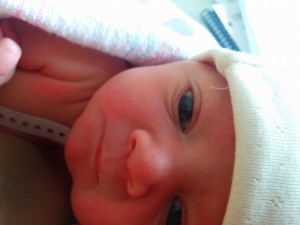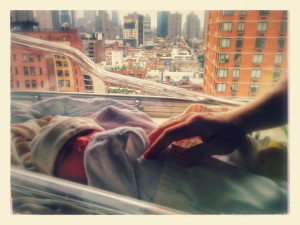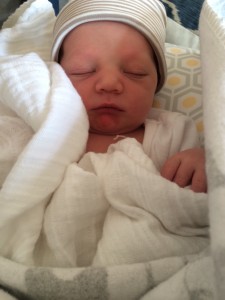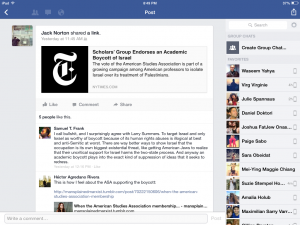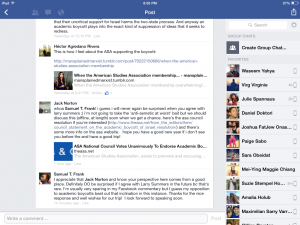When I first read the Times summary of the VOICE study I was overtaken by a feeling of unease. Reading the actual report in the New England Journal of Medicine (NEJM) did little to assuage these feelings. In her recent Oped, published in Al Jazeera America, Susser succinctly explains what the Times and the VOICE researchers got wrong and shows how future studies can avoid these errors.
Category Archives: family
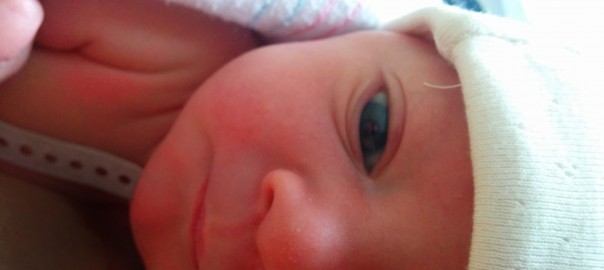
Announcing Solomon Bear Mervyn Kreniske
Announcing Solomon Bear Mervyn Kreniske
I am so happy to share the news about the littlest Kreniske.
After a long and arduous journey, Solomon Bear Mervyn entered this world on 9.12.14, weighing in at 7.0 lbs and measuring 21.25 cm. He is the sweetest little bean and we are in awe of him – it’s an event even to see him open his eyes!
The three of us came home happy and healthy saturday night.
cheers!
phil, sandy and sol
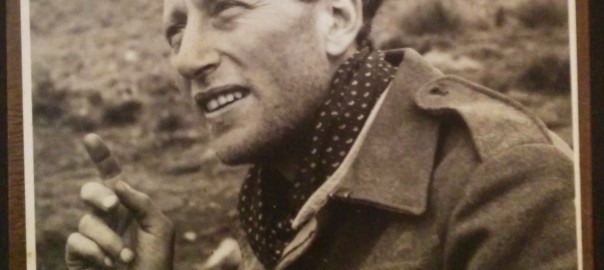
My Grandfather, Mervyn Susser, Passed Away Earlier This Month
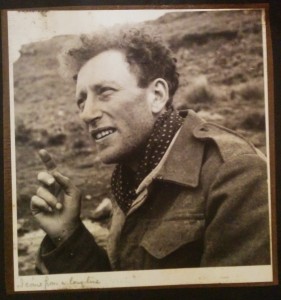
My grandfather Mervyn Susser passed away earlier this month. He was 92, and as one would hope for most people who live to 92, he had an amazing life.
I’m proud of him in so many ways. His work was extremely important to him and I think this recent article from the Times Health section does a good job of summarizing his contributions.
“He learned on the job in the 1950s while working in a clinic that served black South Africans and went on, over the next several decades, to examine peptic ulcers in Europe, hunger in the Netherlands, and AIDS in the United States and in South Africa. He and his wife, Dr. Zena Stein, promoted some of the earliest educational and treatment programs for AIDS in South Africa. Dr. Susser sought to improve public health from the ground up by gathering data on who was affected by diseases and why, and by trying to understand what their distinctive social and economic circumstances were”.
Though to me he was always Grandpa. Grandpa who spent long hours in his study and wasn’t to be disturbed. Grandpa who’d sit me on his knee and tell about camping in the desert and driving armored cars in the war. Grandpa with his big brimmed hats who knew every plant in the garden and couldn’t walk anywhere without stooping down to weed something. Grandpa who always joined the family for dinner, his booming, deliberate voice, pausing, to make everyone wait as he expounded on Israel, Iraq, global poverty – name it. Grandpa who’d recount playing rugby and cricket, while we watched hours of summer baseball – mostly the Yankees who’d introduced a precocious rookie shortstop.
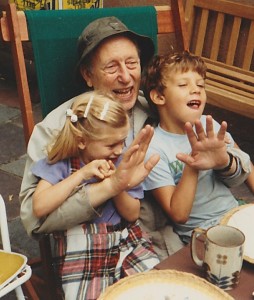
Years later as my family gathered to sit shiva I listened to stories from my mother, uncle and aunt about moving from South Africa, to England and finally settling in New York – and yet never really being English, or American – never belonging anywhere. I reflected on my own experiences of belonging and how in my grandparents house and their garden I’ve felt a deep sense of belonging.
It took them the better part of 50 years but they finally did find a place to make a permanent home for their family. Though for my grandparents, and certainly my grandfather – home would always be South Africa. Some days after he passed away I searched the Times archive for his name. One article published in 1985 and titled Emigres Welcome Apartheid Battle caught my eye. Grandpa – or Mervyn Susser – is quoted, ”We still regard ourselves as displaced South Africans”. With Grandma Zena adding that their home in Hastings was “”a transit camp for South Africans.”
In his final years Grandpa became increasingly confused. As the family gathered for weekend lunches, the Hudson sparkling in the distance, grandpa would say things like “Whoever owns this place has done quite well”. Of course this was the garden he’d created and it was his home.
Then he’d tap grandma on the knee and say “C’mon Zeen it’s time to go”. And the rest of us would smile and gently remind him that of course – he was already home.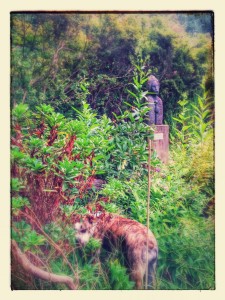
This happened quite often and at one point my brother playfully asked “Grandpa where are you going?”
“To the hotel, in Grootfontein,” his childhood home.
In his final weeks he stopped commenting on the lovely view from the veranda, and he stopped urging Zena to take him home. To check on him we’d sometimes ask, “Grandpa where are you?” And he’d reply confidently “In Grootfontein”.
As he said to the Times reporter all those years before, South Africa would always be his home. Though for us grandchildren he’s created a new home in Hastings. And of course it’s not the just the place but the wonderful and caring family who come together there that make it home.
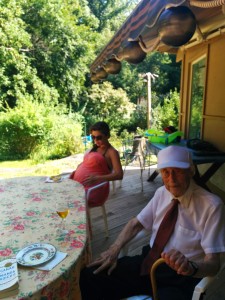
…for the record a couple other obits were published since I wrote this:
Mervyn Susser obit ZA Sunday Times pdf
and
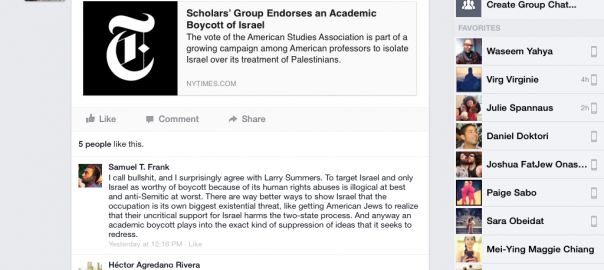
Talking Academic Boycotts Online
Recently the NY times published a piece regarding the academic boycott of Israel.
As a graduate student and New York Jew with family in Israel, including a brother attending medical school there, I clearly have a stake in this debate. There is also some family history involved; my grandparents worked with the ANC, and in part due to their political activities, were eventually forced to leave South Africa for England with their three young children (a journey that my mother recounts beautifully in the prologue to her book).
Certainly in the short term the boycott draws attention to Israel’s treatment of Palestinians, but at what cost to meaningful academic dialogue and research in the long run?
A good friend and fellow CUNY graduate student, Sam, shared his opinion recently in response to a Facebook post:
Many have likened the recent academic boycott of Israel to the academic boycott of apartheid South Africa. I wonder about historical differences in the two contexts. The history of the Jewish state and the jewish people is quite different from the history of the South African apartheid state. How will my family members, such as my brother, grandmother, and great uncle – who has a dual appointment at an Israeli and an American University – relate to this issue?
Interestingly, the above Facebook conversation ended with both parties agreeing to continue to the conversation offline – which also relates to my interests in how people write in explicitly social settings as opposed to semi-public or more intimate settings.
Clearly these two young men are aware of what’s at stake when debating academic issues involving Israel. What are the implications of their choice to end the conversation here, why didn’t they continue online and what does this mean for the way people write and think while using social media?
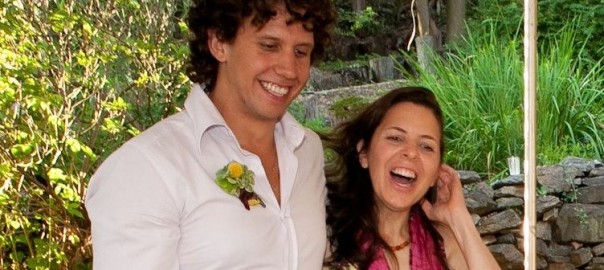
Coming Home
Still working away at my proposal…
However, I can see the light. I’m looking forward to wrapping this semester up – so I can hang with my siblings, who both currently live abroad. My sister arrives from Denmark today, and my brother from Israel next week.
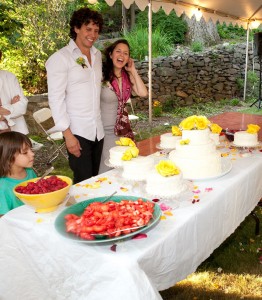
What better way to welcome them back than to share this incredible post my brother wrote about his first few weeks in med school? The post was so good – it earned him an interview with Lonely Planet! So here it is:
Repost from Ben-Gurion University of the Negev, Medical School for International Health Blog,
What Matters Most
by Jonah Kreniske
A gentle breeze wafts in from the balcony, sliding through my open door and bringing a welcome chill. I step out and rest my hands on the iron banister. In the distance I can make out the hills of Ramot, barely lit by a low, rust colored moon. My neighborhood, Gimmel, winds out below me. Undulating Hebrew and Arabic beats from nearby apartment complexes mix with the usual classic rock standards from Coca bar up the street. If it were daytime, you would hear the Ethiopian children across the street playing in the yard of the New Immigrant Absorption Center. But it is almost one in the morning, and they are sleeping now. I should probably be sleeping too. Instead, I’m standing here, breathing in the city. From my balcony I can see Soroka Hospital. A shining invitation to the unwell of the desert night, it is a slice of sleek modernity in the dusty streets.
The past month, in that hospital, has been a whirlwind introduction to our new lives as physicians in training. We have met our classmates and together we have absorbed myriad lectures, and trudged through hours of intensive Ulpan. Now, in this rare moment of relative calm, I look across at the maternity clinic, and I wonder if someone is being born behind those walls. It’s comforting to remember that life begins here. On Monday, walking past the ER to my first class, a weeping woman swept past me. Glancing towards the ER doors she had burst out of, I saw another woman writhing on the floor. An ambulance had just arrived. Never have I heard so much pain in the voice of another human being as I heard in the cries of that woman outside the ER, on my way to 8am class. At Soroka we see what we might push to the back of our minds in another context. We see illness and death, birth and health, side-by side, tipping weights on a human scale.

